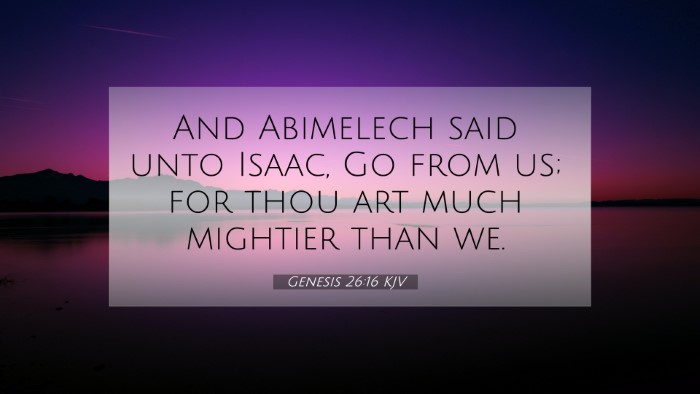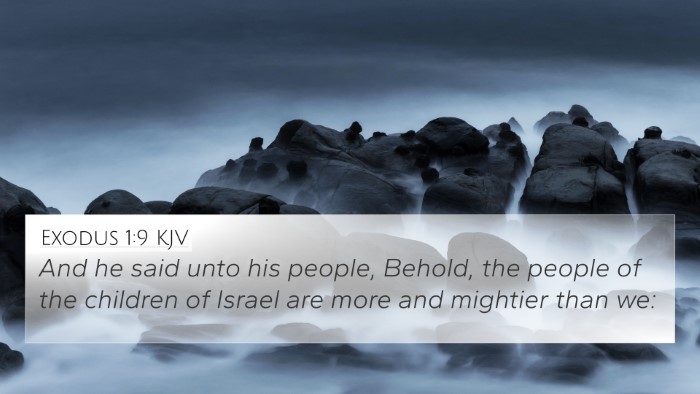Understanding Genesis 26:16
Genesis 26:16 states, "And Abimelech said unto Isaac, Go from us; for thou art much mightier than we." This verse captures a significant moment in Isaac's life, marked by conflict and divine blessing.
Summary of Genesis 26:16
In this verse, we observe King Abimelech's reaction to Isaac's prosperity. The king feels threatened by Isaac's growing influence and the blessings from God that have made Isaac "much mightier" than the Philistines. This reflects the overarching theme of God’s promises manifesting in Isaac’s life, confirming His covenant.
Insights from Public Domain Commentaries
-
Matthew Henry:
Henry points out that the prosperity of Isaac brings about jealousy from the Philistines, emphasizing the idea that blessings can sometimes lead to conflict. He also notes that Abimelech’s request for Isaac to leave is due not merely to fear but also an acknowledgment of God’s hand on Isaac's life, recognizing the divine favor resting upon him.
-
Albert Barnes:
Barnes highlights the idea that Abimelech's fear reflects a broader concern for his kingdom. He interprets the phrase "thou art much mightier" as a recognition of Isaac's increased wealth and influence, which posed a threat to Abimelech's own rule. This verse conveys the complexities of relationships where divine favor is evident, often resulting in antagonism from those around.
-
Adam Clarke:
Clarke elaborates on the historical context, positing that the mention of Isaac's mightiness implies not only wealth but also the potential military power stemming from his growing household. The king’s expulsion of Isaac serves to highlight the tension between God’s chosen and the outside nations, allowing the reader to observe God’s faithful provision amidst adversity.
Bible Cross References
Genesis 26:16 can be connected to several other biblical texts. Below is a list of verses that enhance the understanding of this passage through thematic connections and scriptural cross-referencing:
- Genesis 12:2-3: God's promise to Abraham regarding a great nation and blessings extends to Isaac, demonstrating continuity in God’s covenant.
- Genesis 13:14-17: The promise of land and descendants aligns with Isaac's situation, reinforcing the blessings granted by God.
- Genesis 25:11: This becomes significant in assessing the generational blessings that flow from Abraham to Isaac.
- Genesis 26:14: Highlights Isaac's wealth and the context of conflict over water wells with the Philistines, leading to his eventual confrontation with Abimelech.
- 1 Samuel 2:30: God's promise to honor those who honor Him dovetails with the blessings seen in Isaac’s life.
- Proverbs 16:7: This verse reflects the broader principle of how the Lord will make one’s enemies at peace with them when one’s ways please Him.
- Romans 8:31: A New Testament affirmation that aligns with the theme of divine support against adversaries, echoing God’s favor toward Isaac.
Thematic Connections
This passage aligns with several profound themes within Scripture:
- Covenantal Blessings: Genesis 26:16 exemplifies the fulfillment of the covenant made with Abraham and passed to Isaac, highlighting the continuity of God’s promises.
- Divine Favor vs. Human Opposition: The tension between Isaac’s blessings and Abimelech’s response showcases the conflict often present in the biblical narrative where God’s chosen are opposed by the world.
- God's Provision During Strife: Isaac’s situation reflects God's faithfulness to provide and protect His people even amidst challenges and rivalries.
Tools for Bible Cross-Referencing
To understand and explore such verses in-depth, consider utilizing the following:
- Bible concordance: A valuable tool for finding where words and themes appear throughout Scripture.
- Bible cross-reference guide: Helps in navigating connections between various verses and themes.
- Cross-reference Bible study: Engaging in studies that emphasize the interconnections among biblical texts.
- How to use Bible cross-references: Understanding the methodology of cross-referencing to enrich personal study.
Conclusion
Genesis 26:16 serves as a profound reminder of God’s unwavering promises and the complexities of human relationships fueled by divine favor. Through the insights gained from public domain commentaries and cross-references, one can grasp the depth and connections inherent in this passage, further enriching one's understanding of Scripture.



